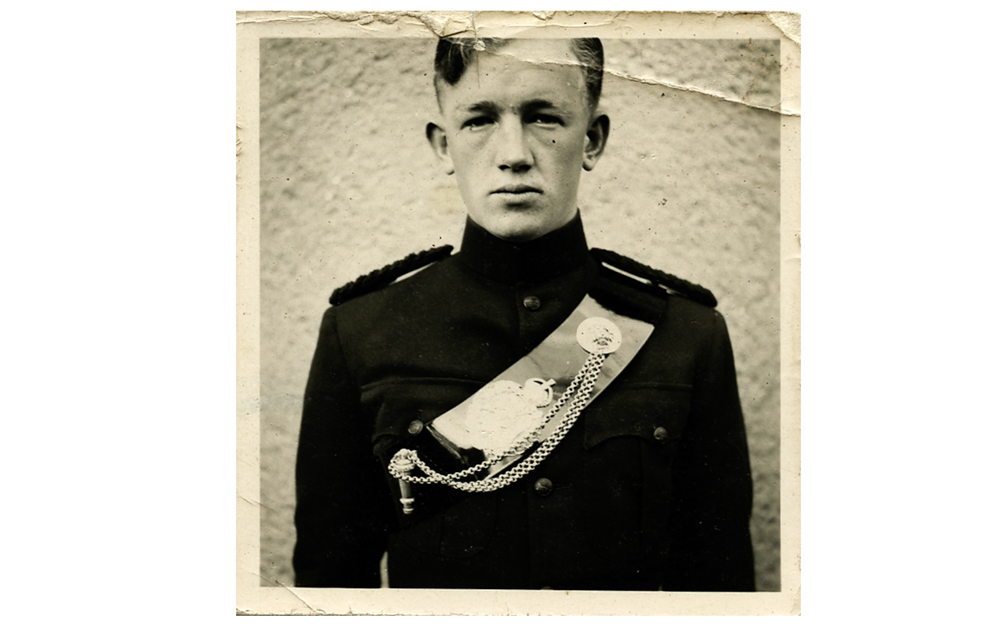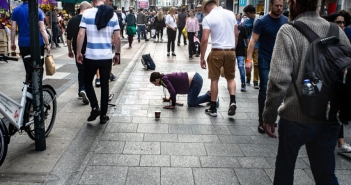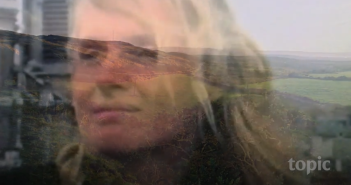Richard Wilson was born in 1931 and has lived all over England. The feature image is of him performing compulsory military service. Further biographic information is provided at the end of the article.
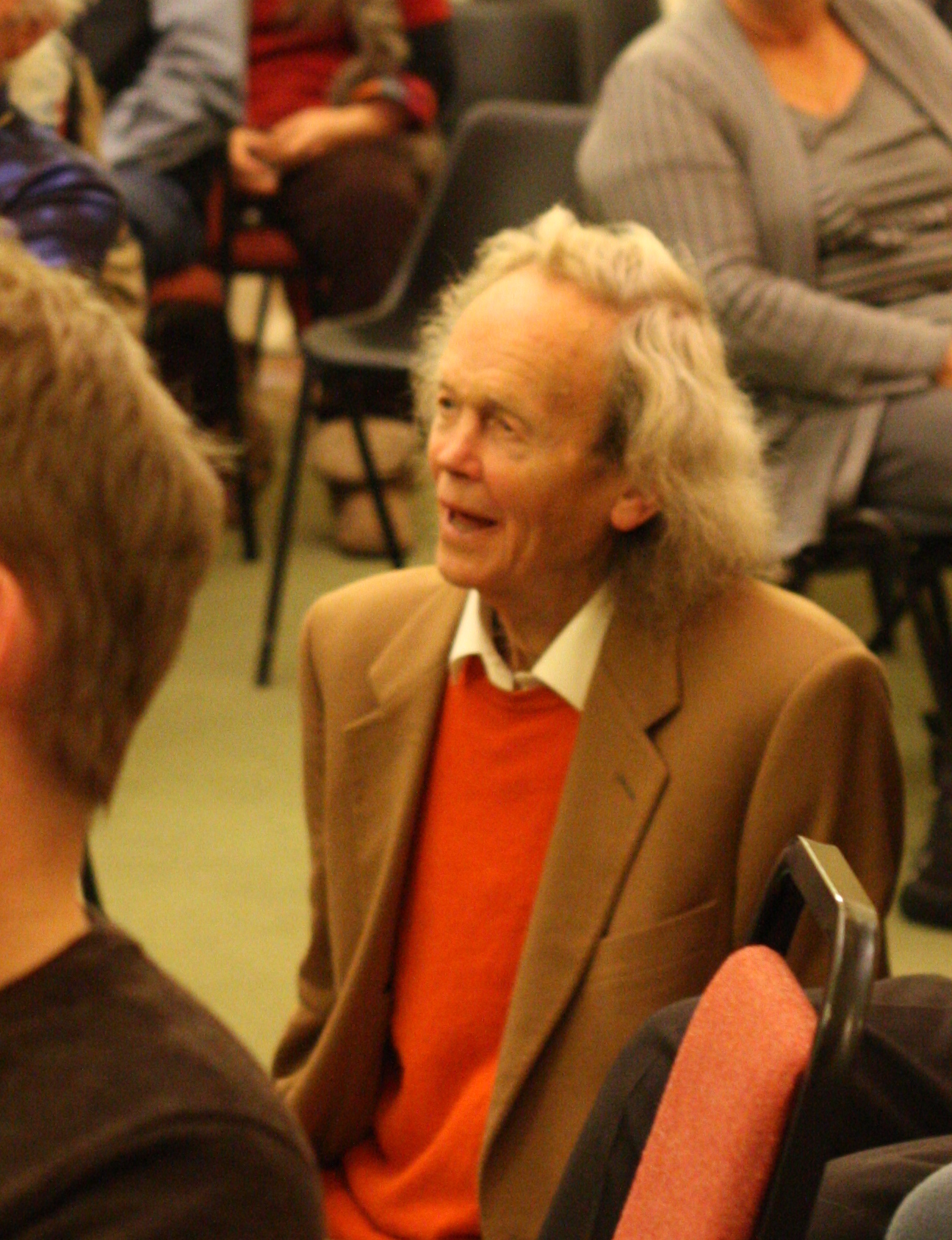
Richard Wilson in 2010.
Has any nation, if you can call the English such, a comparable span of excellence and depravity? In a land of contrasts we find unrivaled gardens alongside the most bleak prisons in Europe; a sense of humour so rich, but languishing below other mature democracies in the OECD’s Better Life Index; rampant helpfulness, despite a social structure engineered to enrich those one per cent that own over half of all wealth; a unique health service and loveliest of nurses found anywhere, allied to doctors, half of whom end up being in it for rich rewards, or besieged by drug companies, paperwork and patient overload.
A pervading kindness too, alas often lost in loveless family contexts, where a controlling, even violent, ideology of child-rearing holds sway. Is it any wonder there are racial tensions in the big cities, and knife attacks rife? Our unparalleled range of pubs are dying out, and being replaced by a culture of binge drinking.
In England we find phenomenal interest in games – were not most actually invented in the UK? – yet, ironically, there is also a spectacular level of obesity. Similarly, a vast range and number of charity shops, coupled with a fear, hatred in some, of immigrants, the very people charities aim to rescue.
We enjoy universal education, yet a mere 20% of teachers are rated as outstanding, the rest drown in bureaucracy and test scores, both largely superfluous, in a format almost wholly unsuited to a child’s needs and wishes: being taught rather than learning. Virtually absent from the curriculum is the development of crucial skills for living such as gardening, construction, or meaningful personal development.
But viewed historically, is twenty-first century England not living through a Golden Age? As recently as the 1930s we could die of hunger, or be cut down in swathes in the 1920s by a flu epidemic that killed thirty million worldwide – three times the number of fatalities as in World War I. Rates of infant and maternal mortality have plummeted, and debilitating childhood illnesses such as polio and tuberculosis have been virtually eliminated. Longevity has soared. No more Wars of the Roses, except on the cricket field.
The working class, and destitute, of 1900 – when my grandfather Henry Wilson was helping to found a Labour party in Bradford – would gasp at the profusion of supermarkets, the diversity and relative good value of food and drink from all over the world. And when you need reviving you simply jump on a cheap flight to one of hundreds of sunny resorts.
But place England in its geographical context and shortcomings leap out. Are we not served by some of the most arrogant and conceited politicians in the world? Brexit, where we are opting out of the first ever European political association that has kept war at bay for over seventy years, prompts not apologetic requests as in a mature divorce, but insulting demands from our leaders. Is it any wonder that people in their twenties and thirties are sickened, if not horrified, by their elders?
So where is the joy in living amongst a divided nation? What may we learn from the Italians who seem to smile perpetually and gloriously; the Spanish and Greeks, infused with gaiety; the Swiss and Germans displaying an exalted thoroughness, the former with a novel form of participatory democracy; the Danes and the Norwegians, with their communal drive to make society work for literally everyone, allied with an environmental conscience – the former now meets its electricity needs entirely with wind energy.
Further afield we find street violence in Japan is almost unknown; a love of life and laughter in Africa in spite of crippling poverty, wars and disease. In Indian society, the only primarily vegetarian in the world, though not without a violent streak, their whole approach to life is like a meandering river, its waters infused with magical otherness, a continuous stream of yoga, raga music, ashrams and Bollywood! Could another country have thrown up a Krishnamurti or a Sadhguru? He contrived last year to have have fifty million trees planted in a single day.
So what is it like to live in England today for most people? The answer is a gigantic difference depending on region, whether urban or rural, social class, wealth or lack of it, physical wellbeing and education level. Watch the Michael Caine film ‘Harry Brown’, a dramatic masterpiece, to see just how tough it is to climb out of social deprivation.
Let us recall another England untouched by industry and ecological distortion. I recall sixty years ago regularly encountering profusions of wild flowers, and wild strawberries; whereas now a twelve mile cycle from the city of Hereford yields a desultory zoo, and a token wayside stretch with eighteen wild flowers from a bygone age. The rest have been obliterated by chemicals and pesticides.
What is equally disheartening for me is that the English have a genius for complaining, but are oblivious, unwilling or incapable, of acting to reduce our carbon footprint, or protest against the phenomenal desecration over the past fifty years of the land, trees, wild grasses, rivers, and free animals. But how can we win when uncaring, profit-seeking, multinational companies, not governments, rule? The grassroots approach to local government of the town of Preston, may prove inspirational.
The great enigma is this: are we on the brink of finally shedding the three-hundred-and-fifty-year-old crippling Cromwellian legacy of Puritanism and self-denial, the Victorian hypocrisy allied (still!) to a vicious class divide? When we add into the mix the pervading commercialism unleashed by Thatcher, is it not a tsunami from which we must flee to high ground?
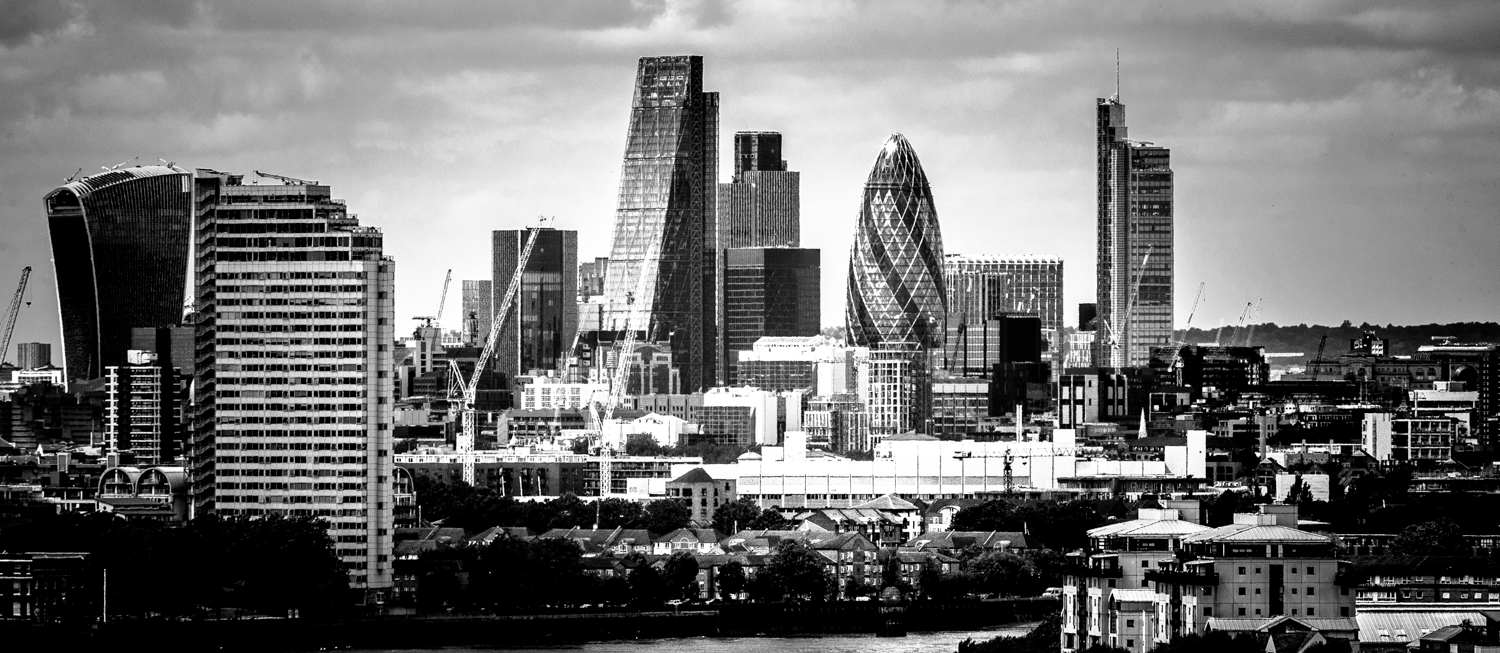
A Cockney taxi driver once said to me that the English are as corrupt as anyone, but the best at concealing it. When I asked a young Frenchman what he thought of England his quick-fire response was: ‘The basic society is shit, but the counter-culture is great’. He identified all that sustained the royal family as injurious to the body politic.
But can that counter-culture of rock bands, the three hundred or so annual folk festivals, or innumerable individual acts of kindness, outweigh the structural deficiencies?
Can we learn from the Irish, who perhaps know the English better even than we know ourselves? There hospitality, poetry and traditional music still seem to count for something, but this has been hard won. Tim Pat Coogan’s Ireland in the 20th Century points out that they have only finally triumphed after three hundred years of often brutal English rule, which created warring factions among themselves.
This is akin to the personal development of experiencing the suffering that leads to passion, so that finally one can see beauty. I wept when I read of General Lake in the 1790s quelling an uprising with murder and torture. Predictably the Irish retaliated and thirty thousand of them were gunned down, men, women and children: our next-door-neighbours.
We cannot escape this side of the English character which a Czech friend once described with three adjectives: pitiless, merciless and ruthless.
Can the richness of Shakespeare’s vision for humanity in tragedy, comedy and histories guide us and make us confront this shameful past? The Dutch scholar Erasmus, on a visit in 1499, writing to a French friend, offers of a glimpse of society at that time. ‘Everywhere you go the girls kiss you on arrival, when you leave and kiss you in between. There is no pleasanter girl than the English.’
Those small affections endure across time. I meet them regularly as I negotiate a heavily-laden trolley through railway stations. I recall once being at the foot of a stairwell with seconds to spare before my train pulled out of the station, whereupon two men, separately, rushed down the stairs, turned round, grabbed my bags and raced with me to the train. Where else in the world would that happen?
Reticence is a common trait, but I found, having made a conscious decision to speak to passers-by, this easily dissolves; whilst in the clover of Cornwall, the checkout girls in Tesco chime: ‘there you are my darling’, or ‘my dearest’, or even ‘my dove’. We have the most wonderful possibility to improve these qualities of affection in ourselves. Indeed the English character bears similarities to English food: fundamentally good ingredients but appalling processing.
Can we reach a point where a restored appreciation for poetry, music and drama culminates in a Shakespeare for our time? Maybe then, not 35%, but 95% will lead fulfilled, colourful lives. But how to sidestep the paradoxical constraints of modern technology? Some of us may choose to be inquisitive nomads, roaming the wide world not the world wide web; refusing to settle for a humdrum semi-d or high rise flat, the ugliness of which must lower the spirit.
*******
With the evaporation of the Village Green Society – shop, post office, church-going, pub – is there anything to hold anyone with Sense and Sensibility in England? At the helm, goons like Gove, jokers like Johnson, the darling buddies of May, turn governing into a Molière comedy, or even a Feydeau farce, acted out in an anachronistic building, two sides facing one another in a slanging match, redolent of a school playground, instead of Knights of the Round Table in harmonious dialogue.
This remarkably animal-loving people recently permitted a road closure above Bath to last six weeks to allow toads their annual hop along their preferred route. Yet hypocrisy runs deep, as most eat animals reared in factory farms, and slaughtered in hideous abattoirs. Where is the compassion and love to create the frequent friendly interaction that still exists in the typical African family hut?
But what a wealth of humour has emerged in England over the last century, from Wodehouse, Saki, Frank Muir and Dennis Norden, Peter Sellers, John Bird and John Fortune, Peter Cook and Dudley Moore and my favourite comic genius Miles Kington, who wrote over 5000 articles for The Times and The Independent.
I find it almost unbearable to think of so many being compelled to work at twice their natural pace, and twice as long as their bodies can stand, indoors, encircled by machines, all in the context of an over-regulated and absurd bureaucracy.
Two outcomes of this are that all of the Health Visitors in one part of a county were absent at one point from stress, while in another, in a Referral School for disturbed children, all the staff bar one became so disturbed that by a certain stage all had experienced nervous breakdown.
And lest we forget that rough sleeping is on the rise, and the young cannot afford to buy houses, whilst we sell arms to countries with extremely questionable human rights records.
We now propose constructing a £55.7 billion railway, H2S at a mere £403 million per mile, when there are not enough houses. Its name is the same as H2S, the chemical formula for Hydrogen Sulphide, commonly known as rotten egg gas.
The final crazy contrast is that a glorious diversity of races should be married to a ruthless murder of plant diversity. The only remedy is to stay insanely positive, and unshakably optimistic that the rising generation will triumph and take us down ‘the road less travelled and that will make all the difference’.
Richard Wilson was born in 1931 and grew up in Yorkshire, Oxford and Malaysia where his father was a colonial official. He spent most of World War II in Australia, along with his mother, brother and sister, while his father was interned by the Japanese. Returning to England afterwards he completed his secondary education in Rugby School, where he developed an enduring affection for the oval-balled game. After compulsory military service he read history at Brasenose College, Oxford, before embarking on a career in the music industry, first with EMI. Later he opened his own record shop in Exeter, the Left Bank, which became the most successful independently-owned such store in the country, renowned for its selection of Classical music. In the 1970s he moved to Hereford, where he spent ten years running another record shop, and in the ensuing thirty organised over fifty concerts featuring world class musicians, seven of them a complete cycle of Beethoven piano sonatas. He recently moved to Cornwall in the South-West of England, but is currently wintering in the French Alps where he indulges an enduring passion for the piste. He has never been on an airplane in his life, but manages to make regular visits, using overland conveyance, to his extended family which includes two great-grandsons and a wide circle of friends in Britain, Ireland and Czech Republic.
English Nature at Peace in my Youth
Remember, remember
The first of September
The sky, the wind, the rain
Knew season had to chain
Its heart, its soul, its breath
To change from August warmth
Let leaves go yellow brown
Ripe corn gently cut down
Bliss, bliss Ode to Autumn
Sure as farewell to sun
The sun that browned, not burn
The skin of child who’d learned
To race along the sand
On edge of sea, dance grand
With golden hair that gleamed
Oh smile of joy which dreamed
No thought of wanton harm
That would destroy the charm
Of settled Nature’s ways
Through man’s thoughtless mad craze
For wealth, for change that lost
Ironically, what meant most
To man’s inward calm growth
From war, hurt, greed and sloth
The heart cries out why, why?
Can we not cling to sky
Of blue, not grey, of love
That makes each man a dove

